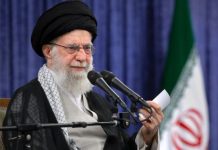by Muhammad Mohsin Iqbal
The situation in the Middle East has once again reached a critical juncture, with Israel’s ongoing violence and military operations against Palestine and Lebanon raising grave concerns. For decades, the Palestinian people have been subjected to a relentless cycle of occupation, displacement, and brutal aggression. This continued bloodshed prompts a pressing question: who, if anyone, will step in to stop Israel from its unchecked violence, brutality, and what many perceive as state-sponsored terrorism?
Israel’s actions in Gaza, the West Bank, and against Palestinian civilians are not isolated incidents. These are part of a larger, systemic issue that has existed since the creation of Israel in 1948. What we see today is the continuation of a long history of dispossession and violent enforcement of Israeli control over Palestinian lands. Homes are demolished, civilians are killed, children are left traumatized, and entire communities are displaced under the banner of security. Yet, the world watches, and little is done to halt this relentless oppression.
The hypocrisy of the international community, particularly the United Nations, is glaring. On the one hand, the United Nations holds its high-profile meetings in the American state of New York, talking endlessly about peace, human rights, and the importance of dialogue in resolving conflicts. Yet, on the other hand, Israel, a nation that often claims to be acting in self-defense, is ruthlessly massacring Muslims by raining gunpowder and bombs on innocent civilians in Palestine and Lebanon. The disconnect between the rhetoric of peace and the reality on the ground reveals a deep failure of international institutions that are supposed to protect the vulnerable and uphold justice. While diplomats debate in air-conditioned rooms, entire families in Gaza are obliterated, and Lebanese towns are reduced to rubble, raising the question of whether the global powers are genuinely committed to peace or complicit in perpetuating violence.
This disturbing contrast highlights the impotence of the UN and its inability to enforce its own resolutions, particularly when it comes to holding Israel accountable. Despite numerous calls for ceasefires and humanitarian access, Israel’s military operations continue unabated, shielded by its powerful allies. This brutal cycle of violence and the inaction of international organizations lead many to conclude that the UN has become a stage for empty promises, incapable of stopping the bloodshed. While the world watches, Palestinians and Lebanese Muslims are left to wonder who will stand up for their right to live in peace and dignity, as the bodies of their loved ones pile up amid the smokescreen of diplomatic inaction.
Despite mounting global outrage and condemnation, the international community has largely failed to intervene in any meaningful way. The United Nations has issued countless resolutions, and world leaders have voiced concern, yet Israel continues its policies with impunity. The lack of accountability raises serious questions about the effectiveness of international mechanisms meant to uphold human rights and prevent atrocities.
A major factor in Israel’s ability to act with such impunity is the unwavering support it receives from powerful allies, particularly the United States. The U.S. has been Israel’s most staunch ally, providing billions of dollars in military aid annually and consistently shielding it from international scrutiny. Time and again, the U.S. has used its veto power at the UN Security Council to block resolutions condemning Israel’s actions, effectively paralyzing the international body’s ability to take meaningful action.
The Western media’s portrayal of the conflict also plays a crucial role in shaping public perception. Israel’s actions are often framed as self-defense against terrorism, particularly against groups like Hamas. While no one can deny Israel’s right to defend itself, this narrative conveniently ignores the broader context of occupation, apartheid-like conditions, and the disproportionate use of force against a largely defenseless population. By controlling the narrative, Israel ensures that its actions are seen as defensive rather than aggressive, deflecting criticism and avoiding accountability.
Yet, behind the political maneuvering and media framing lies the stark reality of a people living under siege. Gaza, often described as the world’s largest open-air prison, is subject to airstrikes, blockades, and collective punishment. The West Bank continues to see illegal settlements expand, and Palestinians live under a system that restricts their freedom of movement, access to resources, and basic human rights. These actions meet many definitions of state terrorism, where the purpose is not just to suppress but to instill fear and break the will of an entire population.
The question remains: who will stop Israel from this continued violence? The answer seems elusive, but several potential avenues exist. The most obvious is the role of international law and bodies like the International Criminal Court (ICC). In recent years, the ICC has made moves to investigate Israeli actions in Palestine, particularly focusing on war crimes. While this offers a glimmer of hope for justice, the process is slow, and without widespread international support, its impact is uncertain.
Another avenue could be the resurgence of global civil society movements. The Boycott, Divestment, and Sanctions (BDS) movement, for instance, has gained traction in recent years, pressuring companies and governments to cut ties with Israel over its treatment of Palestinians. Such grassroots movements can create the kind of international pressure that governments seem unwilling or unable to apply.
Moreover, the Arab world, once united in its opposition to Israel, has become fragmented. Many Arab states, particularly in the Gulf, have normalized relations with Israel, prioritizing economic and strategic interests over solidarity with the Palestinian cause. However, recent events, including increased violence in Gaza, have reignited public outcry in these countries, putting pressure on their governments to reconsider their alliances with Israel. If Arab nations were to unify once again and leverage their political and economic influence, they could play a crucial role in halting Israeli aggression.
Ultimately, the most significant change may come from within Israel itself. There is a growing movement of Israelis who oppose the occupation and the continued violence against Palestinians. While still a minority, these groups represent a shift in Israeli society, one that recognizes the moral and political consequences of their country’s actions. The international community must support and amplify these voices, encouraging a future where peace and justice for both Israelis and Palestinians are possible.
In conclusion, the path to stopping Israel’s ongoing bloodshed and brutality is neither simple nor straightforward. It requires a multifaceted approach involving international law, civil society, diplomatic pressure, and internal change within Israel itself. The world cannot continue to stand by and watch as these atrocities unfold. It is not just a matter of politics or strategy; it is a matter of humanity and justice. The question, therefore, is not just who will stop Israel but when will the world finally find the moral courage to act? The answer to that question may well determine the future of peace in the Middle East.

















